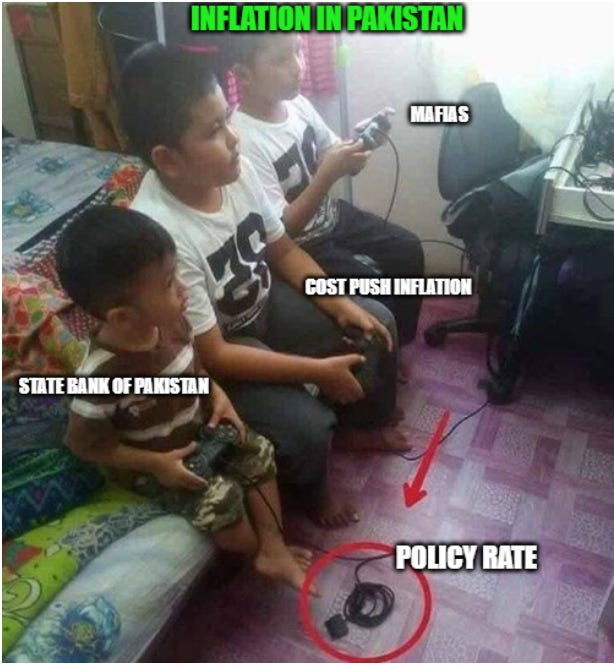Inflation targeting continues to be the party line amongst economists.
SBP does not have the tools to control inflation but economists continue to pretend as if it does.
In my earlier post Revolution at State Bank of Pakistan, I showed that the way Pakistan's economy is structured, SBP does not have the tools to control inflation. Policy/discount rate is the only tool that SBP possesses and SBP wields it like a hammer (when all you have is a hammer...) to control inflation despite history and ground realities proving that it is ineffective.
It boggles the mind that why price stability (inflation targeting) has been made the primary objective of SBP when SBP doesn’t have the capability to control inflation. The fault isn’t with SBP. The economy of Pakistan with low credit penetration, low contribution of private credit to GDP, negligible (0.2%) mortgage penetration, large undocumented economy, and significant control of pricing in the hands of cartels and mafias, is just not suited for the central bank to manage inflation.
The wrong perception about SBP's inflation targeting potency, however, continues to be widespread as in the last few days, I came across three pieces that suggested that SBP can control inflation.
Naafey Sardar wrote an excellent piece How should SBP respond to changes in oil prices in Pakistan? analyzing historical data to measure the impact of oil price shocks on both headline and core inflation in Pakistan. However, in the recommendation, he suggests using the policy rate to control inflation caused by oil price changes.
Since each kind of oil price shock has an asymmetric effect on inflation, it is important to decompose oil price movements into the respective supply and demand component. Anticipating the source of the oil price shock before time is essential in determining the optimal monetary policy response of the SBP to oil price shocks. A credible and forward-looking SBP, which will be responsible for meeting its respective inflation target in the near future, could forecast the source of oil price shocks by applying a mix of actual and forecasted data for variables like global crude oil production, real economic activity index and the real price of Dubai crude oil, to the econometric specifications of Kilian (2009) and Känzig (2020) Doing so, would allow the SBP to devise its policy rate in a way that it is able to meet the inflation target.
Ahmed Jamal Pirzada of the University of Bristol published Price stability as SBP’s primary objective in Business Recorder in support of inflation targeting mandate of SBP citing working papers on how other central banks have moved towards inflation targeting regime.
The collective experience of developing economies shows that inflation targeting has been most effective in how the central bank should conducts monetary policy in these economies. There is evidence that this has not only reduced the likelihood of a currency crisis in these economies but has also reduced the volatility in output growth. Most importantly, _“there is no evidence that inflation targeting has been detrimental to growth, productivity, employment, or other measures of economic performance in either developed and developing economies”_ (Svensson, 2010).
However, the article does not discuss at all how Pakistan's economy compares to other economies and how can SBP target inflation.
Finally, there is this weird editorial Putting a lid on inflation in Business Recorder last week. At first, it says that Finance Minister is trying to fight inflation when it should be SBP's mandate and alludes to Milton Friedman's famous statement "Inflation always and everywhere is a monetary phenomenon."
Azhar would also have wanted to push things along and show his seriousness because it was high inflation, after all, which led to the rather unceremonious departure of his predecessor. **Yet given that inflation is a monetary phenomenon and therefore more a matter for the central bank to fix than the finance ministry**, it is still not clear how or why it suddenly became the reason to axe Hafeez Sheikh or, for that matter, precisely what Hammad Azhar is going to do about it.
Then a few lines later, the editorial contradicts itself by saying that inflation is caused by supply-side factors and mafias (hence not a monetary phenomenon that the central bank can do anything about).
Our inflation is not the usual demand-pull type, because aggregate demand is hardly roaring, it is the more suspect cost-push variety and the main reason, as explained time and again by the prime minister himself, is mafias that create artificial shortages and manipulate prices of essential items.
Finally, the editorial ends by asking the finance minister to communicate a "master plan" to people.
The government is now expected to find a way to control inflation, which is already high enough to become the people's number-one problem. Moreover, Finance Minister Azhar must communicate the master plan to the people.
I believe this meme (updated to substitute fiscal deficit with mafia) conveys it best.
There is still time to reassert that price stability as SBP’s primary mandate is not supported by theory or history. But if the academics continue to portray it as such in newspapers and blogs, there is a likelihood that this will become conventional wisdom especially when the debate over this is dwarfed by the larger discussion over SBP’s independence.


